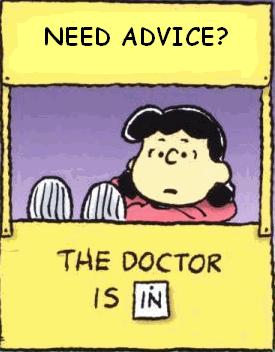 Have you ever received bad advice? Or worse, acted on it? Been given information that hurt more than it helped? Perhaps you hired someone based on a referral who fell short of expectations? Or pursued a sales opportunity that merely wasted time? Or started a relationship that ended with a thud? Or ended a relationship that you wished you would have stayed in? Or made a bad investment? Or cut an expense that ended up costing you more than you saved? With all the advice people give and receive, bad advice and its consequences seem unavoidable.
Have you ever received bad advice? Or worse, acted on it? Been given information that hurt more than it helped? Perhaps you hired someone based on a referral who fell short of expectations? Or pursued a sales opportunity that merely wasted time? Or started a relationship that ended with a thud? Or ended a relationship that you wished you would have stayed in? Or made a bad investment? Or cut an expense that ended up costing you more than you saved? With all the advice people give and receive, bad advice and its consequences seem unavoidable.
Thankfully we are intelligent beings capable of filtering out most bad advice. We have an instinct that guides us to take or reject advice. We have experience that warns us. Yet instincts can be misleading. Our instinct includes biases that often confirm our preconceived notions. Our biases tend to keep us in our comfort zones and reject advice that makes us uncomfortable. We trust people we like which too often is because they say nice things rather than because they are qualified and honorable. While our instinct is capable of filtering out bad advice, it isn’t necessarily trained to do so.
Training requires desiring knowledge, acquiring it, applying it, and reinforcing it. To train your instinct on whose advice to seek, listen to, and act on, listed below are four attributes to commit to memory. Bury these in your subconscious. Apply these every time you seek or receive advice until your instinct is shaped to do so innately.
- Direct Experience – Does the person have extensive and direct experience in the matter being discussed? Or is their experience more indirect? For example, be careful with marriage advice from people who have not successfully overcome the marital issues you are dealing with. Or dating advice from people who haven’t successfully dated. Or children’s advice from a counselor who has no kids. Or an executive coach who hasn’t been an executive. Or dieting guidelines from someone who has never had to lose weight. If a person hasn’t “been there, done that” on multiple occasions in varying contexts, be wary. An often quoted work by Anders Ericsson suggests that anyone with less than 10,000 hours of direct experience has not mastered their domain.
- Current Knowledge – Does the person have current knowledge? The requisite education? Do they keep up with current best practices? Are they considered a contemporary subject-matter expert? True domain experts enroll in continuing education. They are members of multiple industry associations. They speak at industry conferences. They regularly read relevant books, journals, blogs, and articles. Be wary of those who lack the education and whose knowledge hasn’t been maintained. The world’s body of knowledge doubles every few months. Much of what was considered leading thinking a few years ago is now lagging thinking. True subject matter experts might not have written any books, but they could and their books would be hundreds of pages.
- Candid Honesty – Is the person willing to state the brutal truth? Willing to give an honest opinion regardless of how unpopular it might be? Willing to tell you what you need to hear, not just what you want to hear? Does the person push back and expose your biases? A truly honest friend or professional won’t merely accept your thinking. They will challenge your assumptions. In a conflict, they won’t assume your side of the story is the only side. They won’t merely validate your perspective. They will help you confront reality even if it hurts them in doing so. Be wary of people who validate your thinking without probing for more detail. Be wary of people who don’t ask thought-provoking questions that move you out of your comfort zone.
- Honorable Motives – Is the person balanced and unbiased in the matter being discussed? Are there any conflicts of interest that would make their advice not as objective? Does the person have good intentions? Does the person have your best interest in mind rather than theirs or someone else’s? You hopefully love your parents, siblings, and friends, but they are not unbiased. They might have good intentions, but their intentions might be more about maintaining harmony than being honest. Neither are your employees unbiased. They might think they have more to gain by telling you what you want to hear than what you need to hear. People say things on dates, on job interviews, and in sales presentations that are self-serving. Be wary of people’s advice who have something to gain from giving it, especially if you don’t know or respect their character.
Use these four attributes to train your instinct to overcome any inherent biases you may have developed. Learn to discern between advice worth following and advice to be discarded.
